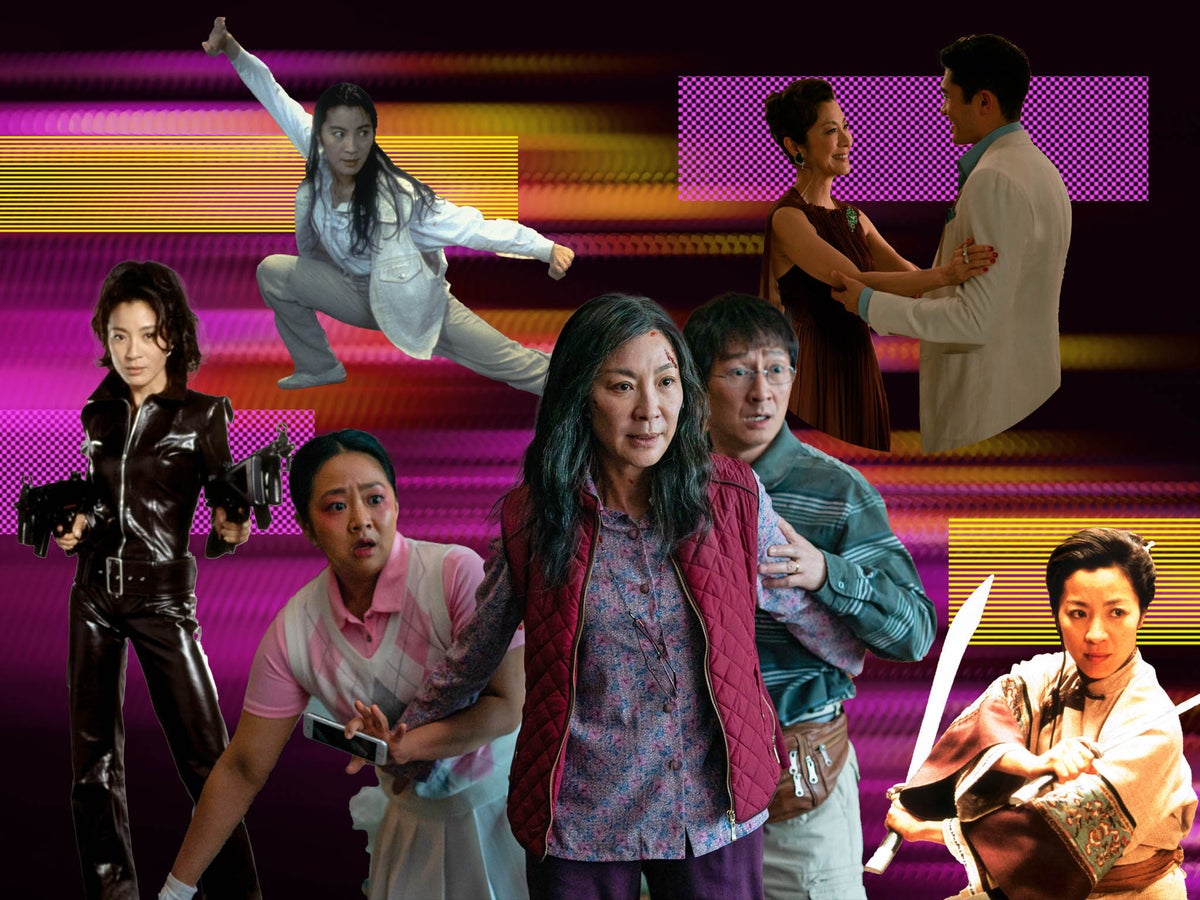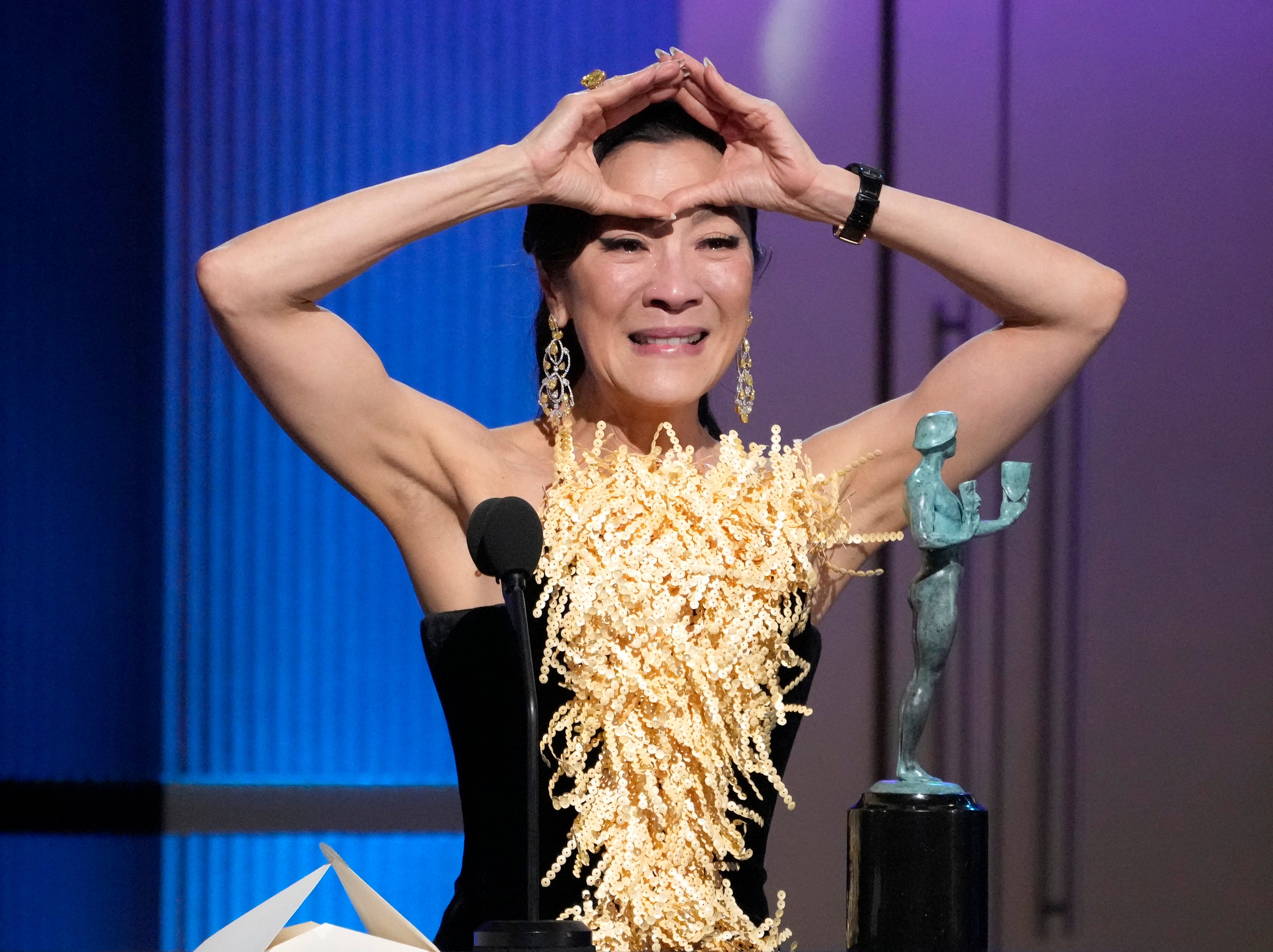
I waited a long time for this,” Michelle Yeoh told me back in May last year, visibly emotional as she spoke. The revered doyenne of Asian cinema and stunt legend was speaking about recognition in general, which after decades in the industry, she was finally receiving in abundance thanks to her leading role in Everything Everywhere All At Once. There’s a good chance the Oscars were hardly on her mind then. The film and Yeoh were fantastic, but it was assumed that its early release meant EEAO would be forgotten come awards season.
And yet here we are, post-Oscars 2023, and the eccentric, unlikely comedy-drama has managed to dominate the ceremony. Thanks to EEAO, Yeoh has garnered praise and, in the past few months, some shiny trophies, too. She has picked up a Golden Globe and Screen Actors Guild award for her performance. She is the first Asian to win the Academy Award for Best Actress. Yeoh’s career has been far from smooth sailing, though. Her story, with its underdog arc, Rocky Balboa-esque transformation and Quentin Tarantino cameo, is fit for a film adaptation itself.
To learn Yeoh was once a ballet dancer is to understand something integral about her. Or at least, begin to understand where her ethereal grace comes from, not to mention that perfect posture, which she somehow maintains even when flying through the air or landing a right hook. Born to an upper-class family in Ipoh, Malaysia, Yeoh moved to London at 15 to study ballet at the Royal Academy of Dance, only for a back injury (her first of many) to extinguish those dreams. She returned home, where her mother entered her in the 1983 Miss World Malaysia beauty contest. Yeoh won. Soon she found herself on set opposite Jackie Chan, not shooting a film, mind you, but a watch commercial. She was “just a pretty face” at that point.
In the Eighties, the Hong Kong action scene was very much a boy’s club. Yeoh said so herself. She managed to infiltrate that world like a Trojan horse. She agreed to star in 1984’s The Owl vs Bumbo, appearing in a role best described as damsel in distress. It was more swooning than striking. Seeing her male co-stars bump and brawl, Yeoh wanted a shot herself. The next few weeks played out like a Rocky Balboa montage, or that iconic “I’ll Make a Man Out of You” sequence in Disney’s Mulan. “I cut off my hair and I trained hard,” she recalled. It paid off. Within a year, Yeoh was the lead of her own kung fu movie, Yes, Madam! Even in today’s context, the stunts she performed in that movie are jaw-dropping. In 1988, when she was 25, Yeoh married studio head Dickson Poon and retired, hoping to start a family. She couldn’t have kids, however, and they divorced in 1991. She returned to work.
Over the next few years, Yeoh established herself as one to know – and to respect. For 1992’s Supercop, she joined forces again with Chan, only this time as a martial arts expert rather than a model. It apparently took some time for her co-star to adjust to this new dynamic. Years later, Yeoh told David Letterman that Chan, while a “very good friend” of hers, believed that women “should stay at home and cook”. Last year, she divulged that Chan no longer holds such beliefs, not after she “kicked his butt”.
In 1995, injury struck again. Yeoh had flung herself onto a moving truck from an 18ft overpass when filming The Stunt Woman and fractured a vertebra, plus several ribs on impact. Immobilised in a neck and back brace, she thought her career was over. It was Quentin Tarantino who rushed to her bedside and implored her to stunt another day. “He wore me down,” Yeoh told Country and Town House. Tarantino was a huge fan of hers, having previously said Supercop – regularly cited as one of the best action films of all time – was a source of inspiration for Kill Bill. If he was such a fan, you might ask why he didn’t cast her in his iconic revenge thriller instead. Yeoh wondered this, too. She says that he told her: “Who would believe that Uma Thurman could kick your ass?”
It was only a matter of time before Hollywood came knocking, regardless. She stormed the Western world on the back of Pierce Brosnan’s motorbike in 1997’s Tomorrow Never Dies. With her own Hong Kong stunt team in tow, Yeoh arrived on set and stunned the Brits with her no-holds-barred approach to filming action scenes. “Our boys were jumping off buildings onto 10 feet of cardboard boxes,” director Roger Spottiswoode told The Telegraph earlier this year. “Whereas Michelle could land safely on an inch-thick rubber matt.”
Her scene-stealing role as Wai Lin led Ang Lee to cast Yeoh in his 2000 martial arts masterpiece Crouching Tiger Hidden Dragon. Lee told The Telegraph that Yeoh had defied every expectation that came with the Bond girl label. “She and Pierce were two equally matched movie stars,” he said. Crouching Tiger was a hit – it became the first foreign-language movie to break $100m in the US – but as Yeoh told me, the box office numbers did not translate to meaningful change for Asian representation on screen. In the following years, she starred in titles such as Memoirs of a Geisha (2005), Danny Boyle’s sci-fi thriller Sunshine (2007) and historical drama The Lady (2011).

Hollywood is still catching up to Yeoh, but over time, the landscape has diversified enough to allow her a thrilling and unexpected second act of her career. In the past five years, she has starred in two Marvel films, big budget rom-com Crazy Rich Asians, and the much-anticipated spin-off of Netflix’s The Witcher. The most exciting of the bunch, though, is undoubtedly EEAO – perhaps because it sees Yeoh play so brilliantly against type. In everything else, she is the picture of poise; that ballet background shines through not only in her perfectly extended Muay Thai kicks but in her stoic composure. As Evelyn – a Chinese American immigrant struggling to keep her laundromat afloat, and her relationships with her husband, father and daughter alive – she is dishevelled and messy. There’s no doubt that Yeoh’s physical prowess remains thrilling to watch (at 60, she still does most of her own stunts) but her fight scenes are compounded by a performance that is grounded and human. Who would’ve thought the most extraordinary thing for Michelle Yeoh to play was ordinary?
Across this awards season, Yeoh has been a vocal campaigner for herself. Earlier this week, she controversially shared a Vogue article, in which a journalist wrote that Cate Blanchett (who was arguably Yeoh’s strongest competitor in the Best Actress category) had already won two Oscars. The point being, a third would have done little for Blanchett, but for Yeoh, “an Oscar would be life-changing”. Yeoh soon deleted the post, but the argument stands. This is an actor who has struggled for decades to gain recognition. If her career has taught her anything, it’s that no one is going to hand you anything, even if you deserve it; you have to fight for yourself.







